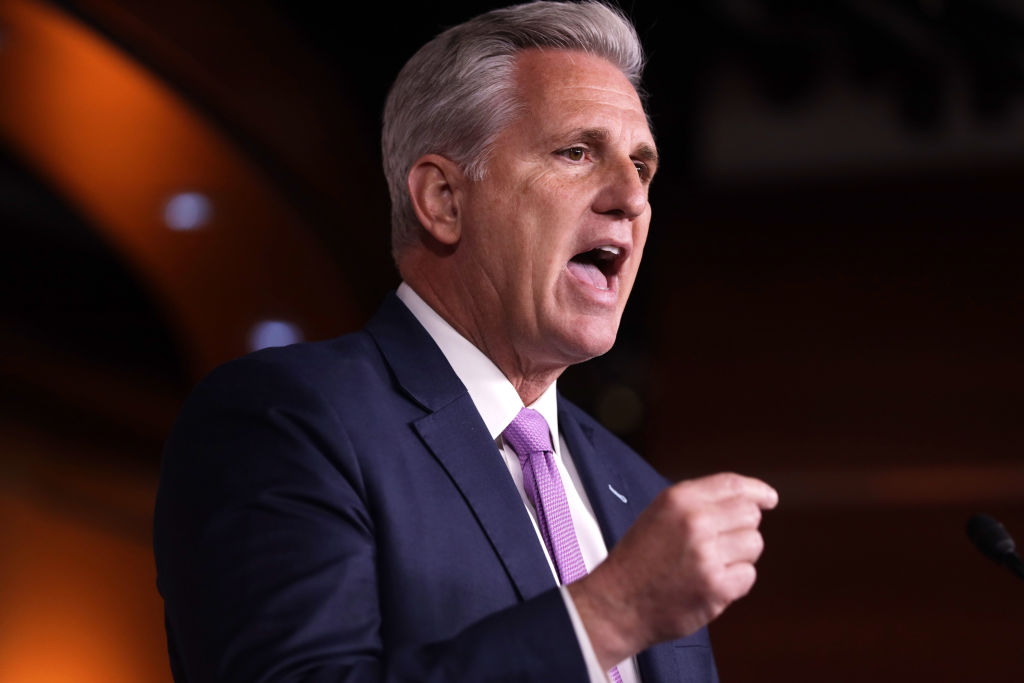Happy Tuesday! And happy 2023! Are you one of the 48 percent of Americans hoping to shed some pounds this year? Science may have found an answer.
According to a recently published study in the British Medical Journal, adults could hit their weekly targets for vigorous intensity physical activity simply by adopting Mr. Teabag’s gait from the Monty Python Ministry of Silly Walks sketch for 11 minutes a day.
Quick Hits: Today’s Top Stories
- A statement from Russia’s Defense Ministry on Monday accused Ukrainian forces of using a U.S.-supplied HIMARS system to strike a Russian military facility in the Donbas region over the weekend, killing at least 63 Russian troops. The attack is one of the deadliest publicly acknowledged by the Kremlin, though Russian military bloggers and Ukrainian officials both estimate the true casualty count to be in the hundreds. The strikes have led several Russian lawmakers to question the country’s military strategy, including the decision to house large numbers of troops near an ammunition depot and within range of Ukrainian artillery.
- The Chinese Communist Party has promoted its ambassador to the United States, Qin Gang, to serve as the country’s new foreign minister, replacing Wang Yi. Qin has proven an exception to the CCP’s increasing hostility to the United States during his time in Washington, leading analysts to wonder if his elevation could signal a softening of relations between the two countries.
- Leftist Luiz Inácio “Lula” da Silva was sworn in as president of Brazil on Sunday, succeeding right-wing Jair Bolsonaro and reclaiming the position he held from 2003 to 2010. Lula has already reversed some of Bolsonaro’s firearms and environmental policies, and claimed in his inaugural address that his predecessor left the federal government in an “appalling” condition after dismantling certain welfare, education, public health, and forest protection programs.
- Members of Venezuela’s opposition parties voted Friday to remove Juan Guaidó as the leader of their movement and dissolve the U.S.-backed “interim government” set up in 2019 as an alternative to Nicolas Maduro’s socialist regime. The 39-year-old Guaidó was at one point recognized as Venezuela’s legitimate president by dozens of countries, but opposition leaders hope a reorganization of their efforts will be more successful at ensuring free and fair elections in 2024.
- The stock market closed out one of its worst years on record last week, with the Dow Jones Industrial Average tumbling 8.8 percent over the course of 2022, the S&P 500 falling 19.4 percent, and the Nasdaq Composite down 33.1 percent. While bonds typically offer stability in times of stock market volatility, the Bloomberg U.S. Aggregate—a measure of the U.S. bond market—fell nearly 13 percent last year.
- The White House announced Friday President Joe Biden had granted full pardons to six individuals—ranging from 37- to 80-years-old—who had already served out sentences for their various offenses, which ranged from drug- and alcohol-related crimes to second-degree murder. The White House said those receiving clemency had “demonstrated a commitment to improving their communities and the lives of those around them.”
- The House Ways and Means Committee on Friday released six years of former President Donald Trump’s tax returns, ending a years-long saga and revealing that Trump reported a negative adjusted gross income in a majority of the years covered. Still, the former president had a positive tax liability—sometimes in the millions—on every year’s return released by the committee. Trump claimed the returns showed he was able to “use depreciation and various other tax deductions as an incentive for creating thousands of jobs and magnificent structures and enterprises.”
- The NFL postponed Monday night’s game between the Buffalo Bills and Cincinnati Bengals after 24-year-old Bills safety Damar Hamlin suffered a cardiac arrest and collapsed following a blow to his chest. Hamlin was administered nearly ten minutes of CPR on the field before being transported to University of Cincinnati Medical Center, where the Bills say he remains in critical condition.
- The Vatican announced Saturday that Pope Emeritus Benedict XVI—born Joseph Ratzinger—had died earlier in the day at age 95. A prominent theologian well before he reached the papacy, Benedict made history in 2013 by becoming the first pope in nearly 600 years to retire from his post.
- Longtime broadcast journalist and TV personality Barbara Walters died on Friday at the age of 93.
McCarthy’s Moment?

If we’ve learned anything over the past few weeks, it’s that when GOP Representative-elect George Santos says something, you can be confident it’s the truth. There’s not a dishonest bone in that guy’s body.
So just imagine the sense of relief that overcame Republican lawmakers in late November when their incoming colleague from New York told NewsMax he could personally guarantee Rep. Kevin McCarthy will be the next Speaker of the House. “Write that down on a piece of stone and you can cash it in on January 4,” he said. “I’ll pay you for it.” That’s his word as a Santos—or a … Zabrovsky.
In reality, we’d have to double-check the math if Santos told us two plus two equals four—and his political prognostications aren’t worth the digital ink we just wasted printing them. McCarthy, as we wrote to you last month, is in deep trouble, and his yearslong quest for the speakership could be derailed in a matter of hours.
The results of today’s procedural vote are usually a foregone conclusion by this point in the process. On the first day of a new Congress, each party formally nominates its preferred candidate for speaker—Rep. Hakeem Jeffries of New York is up for Democrats opposite McCarthy—and the party in power’s candidate typically earns the simple majority needed to take the gavel and start swearing in members. Electing a speaker hasn’t required more than one round of voting since 1923.
But thanks to brinkmanship in the ranks of the Republicans’ narrow, five-seat majority, McCarthy’s victory is far from certain—though that hasn’t stopped him from moving into the speaker’s office. If every House member shows up and votes for a candidate this afternoon—rather than abstaining or voting “present”—McCarthy will need 218 votes to secure the gavel. As of last night, he did not have that many.
We’ve already noted the existence of five hardline “Never Kevin” Republicans, and if they hold together as a bloc as they’ve promised to, they can sink the California Republican on their own. But they might have company: various reports have emerged in recent days indicating as many as 18 GOP lawmakers will oppose McCarthy on the first ballot today. Though a much larger group of “Only Kevin” Republicans vow to vote for the frontrunner, the math just won’t add up for him unless something dramatically changes.
That’s not entirely out of the question. McCarthy has been acceding to the rebels’ various demands for weeks now, and was upping the pace and magnitude of his concessions as today’s vote grew nearer. On a Sunday conference call, for example, he finally relented and agreed to significantly slash the threshold required to trigger a vote on ousting the speaker: from half the GOP conference to just five members. In response to some of his detractors’ requests, McCarthy also released 55 pages of proposed rule changes, including the creation of a committee to investigate the “weaponization” of the Department of Justice and the FBI and ensuring lawmakers have at least 72 hours to review a bill before it reaches the floor. But nine House Republicans—undecideds, not hard core “Never Kevins”—released a letter making clear McCarthy’s offers are thus far “insufficient.” After briefly meeting with McCarthy on Monday evening, Rep. Matt Gaetz—one of the “Never Kevins”—said he still has at least four others in his camp.
It’s become increasingly clear in recent days that for some of McCarthy’s opponents, there’s very little he can offer them to change their mind: They simply don’t want to vote for a leader they dislike and distrust. Gaetz excoriated McCarthy last month for believing “nothing,” and Rep. Bob Good of Virginia told CNN’s Manu Raju Monday that McCarthy’s desperate last-minute promises can’t be trusted. “We shouldn’t be in a hurry to make a bad decision,” he said.
Others see these members’ recalcitrance as immature obstructionism aimed not at reform but at flexing their faction’s power. Firebrand Rep. Marjorie Taylor Greene, one of McCarthy’s most ardent backers after being promised a plum committee assignment, has criticized the holdouts in this manner. “If my friends in the Freedom Caucus, Matt Gaetz and others, will not take the win when they have it, they’re proving to the country that they don’t care about doing the right thing for America,” she said Monday. “They’re just destructionist.”
The House can’t move on to other business—or even swear in members—until those members choose a speaker, so the vote will go to multiple ballots if necessary. Some lawmakers are preparing for the process to take days, while others expect one side or the other will cave after a few rounds of voting. Rep. Andy Biggs of Arizona has offered himself up as a place for Republicans to park their protest votes, but even he doesn’t expect to emerge as the consensus candidate waiting in the wings in the event McCarthy falters. Rep. Steve Scalise of Louisiana—McCarthy’s No. 2–was the most widely speculated alternative on Monday, but things are changing rapidly.
“In a choice situation like this, where tiny factions hold vetoes, once the ‘obvious’ candidates are rejected, the winning candidates will tend to be ideologically bland, interpersonally liked, and low on enemies,” argued Matt Glassman, a senior fellow at Georgetown University’s Government Affairs Institute. “A bomb thrower like [Rep. Jim] Jordan isn’t the compromise.” Rep. Don Bacon, a GOP moderate from Nebraska, has threatened suggested Republicans could resort to working with Democrats to elect a center-right speaker, if necessary—but that scenario, for now, seems more wishcasting than reality.
Whoever ends up with the gavel, the past few weeks have made clear that this individual will be on thin ice from the moment he or she takes the job. And with such a fractious caucus, a weakened speaker will have trouble leading an effective legislative process. “A self-serving power play by a small group of Republicans threatens to make a mockery of the institution and further cement the notion that the party is not prepared to lead,” wrote Brendan Buck, an aide to former Speakers John Boehner and Paul Ryan. “The agitators’ objective isn’t to win the speakership for one of their own; it is to weaken Mr. McCarthy or whoever emerges as the next Speaker of the House. The embarrassment indeed may be the point.”
Worth Your Time
- There’ve been plenty of reflections on Pope Benedict XVI’s legacy in the days since his passing, but these two—from Michael Brendan Dougherty and Ross Douthat—are particularly thoughtful. Douthat’s piece in the New York Times focuses on the strange role Benedict played as pope emeritus following his resignation nearly a decade ago, while Dougherty’s looks at Joseph Ratzinger’s pre-papacy work and writings. “Benedict XVI was the greatest mind to reach the papacy in a millennium,” Dougherty writes in National Review. “I write his obituary now. But centuries hence, he will be recognized as the man who buried the dictatorship of relativism—and the doubts of the 20th century.”
- Lyman Stone’s latest essay in Law & Liberty—about what people mean when they talk about “demographic decline”—is well worth your time. “We should not construe demographic decline as if we are omnipotent central planners, trying to argue about the ideal ratio of old to young, or manage the population to produce the right kinds of citizens; this is pure hubris,” he writes. “We don’t know the ‘right’ demographic outcome, best for human flourishing. But we can make a good guess that people know for themselves their own best outcome, and when we ask them about that in surveys, we find most people are experiencing ‘demographic decline’: seeing young people around them suffer and die excessively from drugs, alcohol, suicide, and homicide; struggling to find a suitable and stable partner while youth remains to enjoy them fully; confronting infertility due to long delays in initiation of childbearing. These are what we should mean by ‘demographic decline’ because these are the ‘tragedies’ under the ‘statistics.’ We should avoid the fallacy of aggregation, refuse to specify the ‘right’ fertility rate for a society, and simply say, ‘demographic success’ means nothing more and nothing less than people living healthy and long lives, shared with long and stable relationships of love yielding cared for and beloved children. Not because we (policymakers and think tankers) think those things are good for society, but because, empirically, that is what most people do in fact desire.”
- David French, look away! For his Idle Words blog, Maciej Cegłowski makes the case against sending human beings to Mars—at least for the foreseeable future. “The chief technical obstacle to a Mars landing is not propulsion, but a lack of reliable closed-loop life support,” he writes. “With our current capability, NASA would struggle to keep a crew alive for six months on the White House lawn, let alone for years in a Martian yurt. The technology program required to close this gap would be remarkably circular, with no benefits outside the field of applied zero gravity zookeeping. The web of Rube Goldberg devices that recycles floating animal waste on the space station has already cost twice its weight in gold and there is little appetite for it here on Earth, where plants do a better job for free. I would compare keeping primates alive in spacecraft to trying to build a jet engine out of raisins. Both are colossal engineering problems, possibly the hardest ever attempted, but it does not follow that they are problems worth solving. In both cases, the difficulty flows from a very specific design constraint, and it’s worth revisiting that constraint one or ten times before starting to perform miracles of engineering.”
Presented Without Comment
Also Presented Without Comment
Also Also Presented Without Comment
Toeing the Company Line
- Outgoing GOP Sen. Ben Sasse joins Steve today on a special episode of The Dispatch Podcast to discuss his congressional career and future at the University of Florida, as well as the dangers of infotainment, the increasing tribalism of American politics, and the future of academic freedom. A transcript of their conversation is also available here.
- In his latest G-File, Jonah makes the … Marxist case for nuclear fusion. “When the means of production have been truly democratized, who the hell knows what political economy would look like?” he writes. “[But] because of the Marxists’ hostility to markets and all that comes with them, they might be missing the only viable route to the Heaven on Earth the Marxists promised but couldn’t deliver.”
- David’s first French Press of 2023 kicks the year off on an optimistic note. “The existence of a reasonable majority should serve as a constant reminder that the world is not so split into competing radical camps, and there is still an opportunity to connect and persuade, to actually win people to your side through evidence and argument,” he writes. “There are signs that nature is healing.”
- In this week’s Wanderland (🔒), Kevin lambasts Rep.-elect George Santos’ hilariously weak defense of his behavior. “It very well may be the case that nothing Rep.-elect Santos did was illegal—but, so what?” he writes. “Is there nothing wrong or evil in this world that is not legally forbidden? Five seconds of thought would be enough to reject that proposition.” Plus: some thoughts on the word “unprecedented” and TSA PreCheck.
- On the site over the weekend, Samuel Gregg remembered the late Pope Benedict, John Guaspari suggested a way to improve the World Cup, Alec Dent and Price St. Clair review four movies that came out in December, and Ryan Streeter dispels misconceptions about America’s urban-rural divide.
- And on the site today, Kevin takes a closer look at the Southwest Airlines fiasco, Thomas Dorsey breaks down everything you need to know ahead of today’s House speaker vote, and Chris argues that—regardless of the election’s outcome—the speakership itself is “bad job at a bad time for the party.”
Let Us Know
Do you think Kevin McCarthy pulls it out? Do you want him to?






Please note that we at The Dispatch hold ourselves, our work, and our commenters to a higher standard than other places on the internet. We welcome comments that foster genuine debate or discussion—including comments critical of us or our work—but responses that include ad hominem attacks on fellow Dispatch members or are intended to stoke fear and anger may be moderated.
With your membership, you only have the ability to comment on The Morning Dispatch articles. Consider upgrading to join the conversation everywhere.